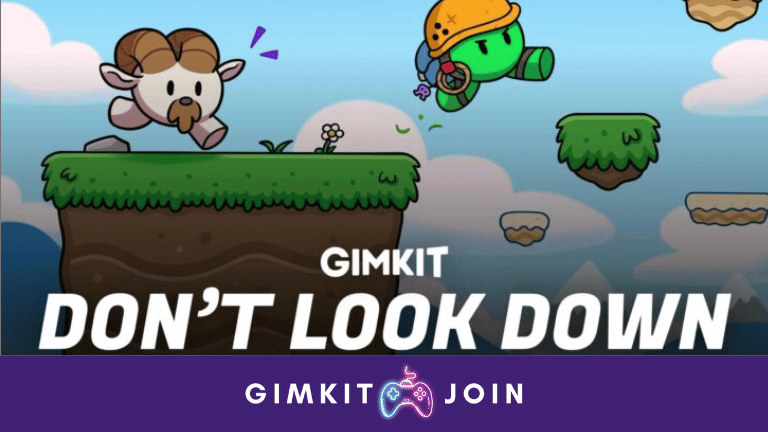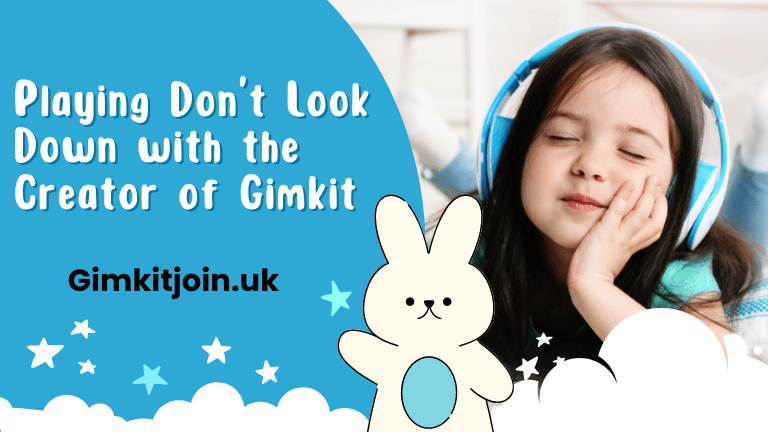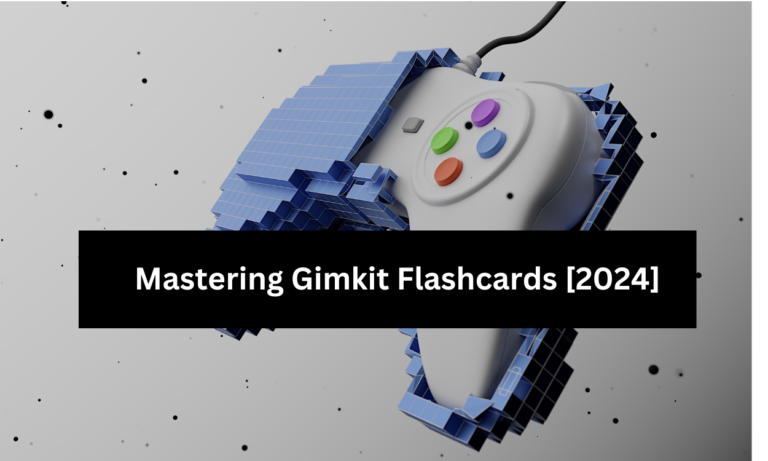Playing Don’t Look Down with the Creator of Gimkit! [2024]
Playing Don’t Look Down with the Creator of Gimkit! Behind this ingenious creation is Russell Minden, the founder and driving force behind Gimkit’s success. In this article, we’ll take a journey into the mind of Russell Minden, explore the origins of Gimkit, and delve into the fascinating game “Don’t Look Down” that he created to showcase the platform’s capabilities.
The Origins of Gimkit
Russell Minden’s journey with Gimkit join began in 2017 when he was a high school math teacher in Philadelphia. Frustrated with the traditional methods of delivering lessons and assessing student understanding, he sought to create a more engaging and interactive learning experience for his students. With a background in computer science and a passion for game development, Minden recognized the potential of gamification in education.
Inspired by the popularity of multiplayer online games and the competitive spirit they fostered, Minden set out to develop a platform that would harness the power of competition and collaboration to enhance the learning process. The result was Gimkit, a game-based learning platform that allowed teachers to create interactive quizzes and challenges, transforming the classroom into a virtual arena where students could compete against one another while mastering academic content.
The Gamification Revolution
Gimkit’s gamification approach resonated with students and educators alike. By injecting elements of fun, competition, and rewards into the learning experience, Gimkit captivated students’ attention and motivated them to actively participate in their education. Teachers could easily create custom quizzes and challenges tailored to their specific curriculum, ensuring that the learning objectives were seamlessly integrated into the gaming experience.
One of the key features that set Gimkit apart was its real-time, multiplayer format. Students could compete against their classmates or even against students from other schools, fostering a sense of friendly rivalry and camaraderie. The platform’s leaderboard system added an extra layer of motivation, as students strived to climb to the top and earn virtual rewards for their achievements.
The Rise of Don’t Look Down
As Gimkit gained traction and popularity, Russell Minden recognized the need to showcase the platform’s capabilities in a compelling and memorable way. Enter “Don’t Look Down,” a game that he created specifically for Gimkit. This game takes the concept of gamified learning to new heights, quite literally.
In Don’t Look Down, players assume the role of a daring individual scaling a towering skyscraper. The objective is to answer a series of questions correctly to ascend the building, floor by floor. However, one wrong answer results in the character plummeting towards the ground, heightening the stakes and adding an element of thrilling suspense.
The game’s premise is simple yet captivating. As players progress through the levels, the questions become increasingly challenging, testing their knowledge and critical thinking skills across various subject areas. The game’s immersive graphics and sound effects further enhance the experience, transporting players into a virtual world where their academic prowess is put to the ultimate test.
The Educational Impact of Don’t Look Down
While Don’t Look Down may appear to be a mere game, its educational impact is profound. By seamlessly integrating academic content into an engaging and entertaining format, Minden has created a powerful tool for promoting active learning and reinforcing key concepts.
One of the game’s strengths lies in its ability to cater to different learning styles. Visual learners are captivated by the vivid graphics and animations, while auditory learners can benefit from the game’s sound effects and narration. Kinesthetic learners, those who learn best through physical engagement, can experience a sense of immersion as they navigate their character through the virtual environment.
Moreover, Don’t Look Down fosters essential skills such as problem-solving, critical thinking, and decision-making. Players must analyze the questions carefully, evaluate the available options, and make informed choices to progress through the game. This process mirrors real-life scenarios where students must apply their knowledge to solve complex problems and make sound decisions.
The Future of Gimkit and Game-Based Learning
The success of Gimkit and the popularity of games like Don’t Look Down have demonstrated the immense potential of game-based learning in the educational landscape. As technology continues to evolve, the possibilities for gamification in education are endless.
Russell Minden and the Gimkit team are constantly exploring new frontiers, developing innovative games and features that push the boundaries of interactive learning. One exciting development is the integration of virtual reality (VR) technology, which could further enhance the immersive nature of games like Don’t Look Down, transporting students into fully realized virtual environments where they can learn through experiential exploration.
Additionally, the rise of artificial intelligence (AI) and machine learning algorithms opens up new avenues for personalized and adaptive learning experiences. By analyzing student performance data and learning patterns, AI-powered systems could dynamically adjust the difficulty levels, question types, and content delivery to cater to each individual student’s needs and strengths.
As the educational landscape continues to shift towards more student-centered and experiential learning approaches, platforms like Gimkit and games like Don’t Look Down will undoubtedly play a pivotal role in shaping the future of education.
Conclusion
Russell Minden’s creation, Gimkit, and the game Don’t Look Down, represent a groundbreaking approach to education that harnesses the power of gamification and interactivity. By transforming the learning process into an engaging and immersive experience, Minden has tapped into the innate human desire for fun, competition, and achievement.
Don’t Look Down serves as a shining example of how game-based learning can captivate students, promote active engagement, and reinforce essential skills such as problem-solving, critical thinking, and decision-making. As the world continues to embrace technological advancements, the potential for gamification in education is boundless, and pioneers like Russell Minden are paving the way for a future where learning is not just a necessity but a thrilling adventure.
The Psychology Behind Game-Based Learning
The success of Gimkit and games like Don’t Look Down lies in their ability to tap into the fundamental psychological principles that drive human motivation and engagement. By understanding these principles, educators and game developers can create experiences that truly resonate with students and foster a love for learning.
The Role of Intrinsic Motivation
One of the key factors that contribute to the effectiveness of game-based learning is its ability to cultivate intrinsic motivation. Intrinsic motivation refers to the inherent drive to engage in an activity for its own sake, rather than external rewards or punishments. When students are intrinsically motivated, they approach learning with genuine interest, curiosity, and a desire to master new skills and knowledge.
Games like Don’t Look Down harness intrinsic motivation by creating an environment that is inherently engaging and enjoyable. The game’s narrative, challenges, and interactive elements tap into the human desire for exploration, problem-solving, and achievement. Students are motivated not by external factors like grades or rewards but by the sheer joy of overcoming obstacles and progressing through the game’s levels.
The Power of Feedback and Progress Tracking
Another psychological principle that underpins the success of game-based learning is the importance of feedback and progress tracking. In traditional educational settings, feedback is often delayed, and progress can be difficult to visualize, leading to disengagement and frustration among students.
Games like Don’t Look Down, however, provide instant feedback and clear progress indicators. As students answer questions correctly, they are immediately rewarded with progress through the virtual environment, reinforcing their sense of accomplishment and motivating them to continue. The game’s leaderboard system further enhances this by allowing students to track their performance relative to their peers, fostering a healthy sense of competition and driving them to strive for continuous improvement.
The Role of Autonomy and Choice
Autonomy and choice are crucial factors in promoting intrinsic motivation and engagement. When students feel a sense of control over their learning experience, they are more likely to invest their time and effort in the process. Gimkit and Don’t Look Down embrace this principle by offering students a degree of autonomy and choice within the game environment.
For example, students may have the option to customize their in-game avatar, select their preferred difficulty level, or even choose the subject areas they want to focus on. This sense of control and personalization allows students to tailor the experience to their individual interests and abilities, promoting a deeper level of engagement and investment in the learning process.
The Importance of Scaffolding and Skill Development
Effective game-based learning platforms like Gimkit recognize the importance of scaffolding and skill development. Just as in traditional educational settings, students require guidance and support to progressively build their knowledge and abilities.
Don’t Look Down achieves this through its adaptive difficulty system, which adjusts the complexity of questions based on a student’s performance. As students demonstrate mastery of a particular concept, the game presents more challenging questions, allowing them to continuously stretch their capabilities and reinforce their understanding.
Additionally, the game’s leveling system provides a visual representation of skill development, motivating students to progress through increasingly difficult stages and unlocking new challenges along the way. This sense of progression and achievement fosters a growth mindset, encouraging students to embrace challenges and view setbacks as opportunities for learning and improvement.
The Impact of Gamification on Student Engagement
The transformative power of game-based learning platforms like Gimkit and games like Don’t Look Down is evident in their ability to captivate and engage students across diverse backgrounds and learning styles. By tapping into the universal appeal of games and leveraging psychological principles, these platforms have the potential to revolutionize the educational landscape.
Addressing the Challenges of Traditional Learning Environments
Traditional learning environments often struggle to maintain student engagement, particularly in the face of competing distractions and the allure of digital entertainment. Games like Don’t Look Down offer a compelling alternative by seamlessly integrating education into a format that students inherently find enjoyable and engaging.
By creating immersive virtual environments and presenting academic content within a narrative context, game-based learning platforms capture students’ attention and foster a sense of curiosity and investment in the learning process. The competitive elements and leaderboard systems further amplify engagement, appealing to students’ innate desire for achievement and recognition.
Fostering Collaborative Learning and Peer Support
One of the unique strengths of Gimkit and games like Don’t Look Down is their ability to foster collaborative learning and peer support. While the game itself may involve individual competition, the overall experience encourages students to work together, share strategies, and support one another in their learning journey.
Classroom discussions and peer-to-peer interactions are naturally integrated into the gameplay, as students share their experiences, celebrate successes, and help each other overcome challenges. This collaborative dynamic not only enhances the learning experience but also promotes essential social skills such as teamwork, communication, and empathy.
Catering to Diverse Learning Styles and Abilities
Traditional educational methods often struggle to accommodate diverse learning styles and abilities, leading to disengagement and underperformance among certain student populations. Game-based learning platforms like Gimkit, however, offer a more inclusive and engaging approach by leveraging multimedia elements and interactive experiences.
Visual learners benefit from the rich graphics and animations, auditory learners can engage with sound effects and narration, and kinesthetic learners can immerse themselves in the interactive environments. Furthermore, the adaptive difficulty settings and customizable options allow students to tailor the experience to their individual strengths and needs, ensuring that no one is left behind or feels overwhelmed.
Bridging the Gap Between Education and Entertainment
One of the most significant impacts of game-based learning platforms like Gimkit and games like Don’t Look Down is their ability to bridge the gap between education and entertainment. For too long, these two realms have been perceived as separate and often conflicting, with education being associated with tedium and entertainment with pure enjoyment.
By seamlessly integrating academic content into engaging and entertaining game environments, platforms like Gimkit challenge this dichotomy. Students no longer view learning as a chore but as an exciting adventure, a journey filled with challenges, rewards, and opportunities for personal growth.
This paradigm shift has the potential to transform attitudes towards education, fostering a love for learning and cultivating a lifelong desire for knowledge and self-improvement. As students discover the joy of mastering new concepts and overcoming obstacles within these game-based environments, they develop a growth mindset that transcends the boundaries of the classroom and prepares them for success in all aspects of life.

FAQs
1. What is “Don’t Look Down” in Gimkit?
Answer: “Don’t Look Down” is a game mode in Gimkit where players must avoid looking down while navigating through various obstacles. The objective is to maintain focus and reach the end of the course without falling.
2. How can I play “Don’t Look Down” with the creator of Gimkit?
Answer: Playing “Don’t Look Down” with the creator of Gimkit typically requires participating in special events or live sessions hosted by the Gimkit team. Keep an eye on Gimkit’s official social media channels, blog, and announcements for opportunities to join these exclusive sessions.
3. What should I expect when playing “Don’t Look Down” with the creator?
Answer: When playing with the creator, expect a fun and engaging experience with direct interaction. The creator may provide tips, tricks, and insights into the game mode, enhancing your overall gameplay experience. There may also be opportunities to ask questions and give feedback.
4. Are there any special requirements to join a “Don’t Look Down” session with the creator?
Answer: Special sessions with the creator may have specific requirements, such as registration, having a Gimkit account, or using a provided join code. Details for each event will be shared in the announcements, so make sure to follow any instructions given.
5. Can I provide feedback or suggest improvements during the session?
Answer: Yes, sessions with the creator often encourage feedback and suggestions. This is a great opportunity to share your thoughts on “Don’t Look Down” and other aspects of Gimkit, helping the team improve the game based on player experiences.





